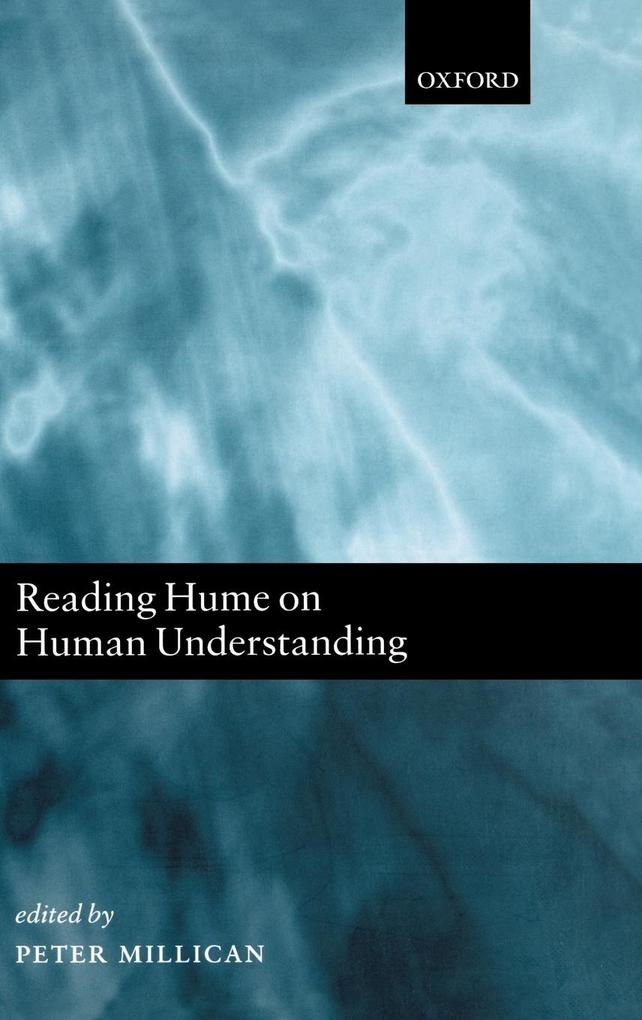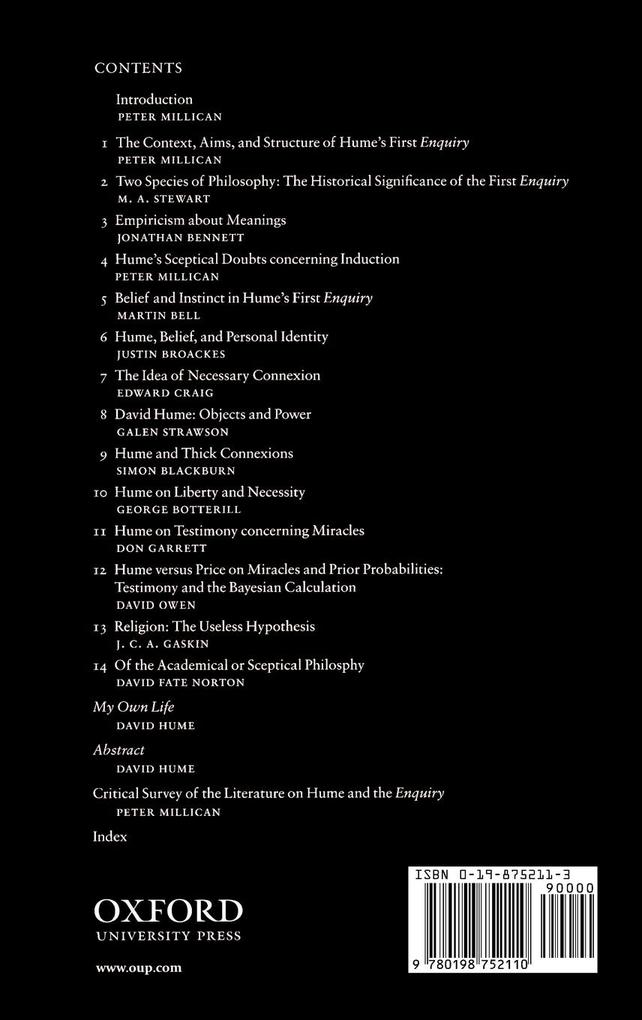
Zustellung: Do, 26.06. - Di, 01.07.
Versand in 2 Wochen
VersandkostenfreiBestellen & in Filiale abholen:
This companion to the study of one of the great works of Western philosophy--David Hume's Enquiry concerning Human Understanding (1748)--provides a general overview of the Enquiry, especially for those approaching it for the first time, and sets it in the context of Hume's philosophical work as a whole. The eminent contributors to the volume cover a broad range of topics: meaning, induction, skepticism, belief, personal identity, causation, freedom, miracles, probability, and religious belief.
Inhaltsverzeichnis
- Introduction
- 1: Peter Millican: The Context, Aims, and Structure of Hume's First Enquiry
- 2: M. A. Stewart: Two Species of Philosophy; The Historical Significance of the First Enquiry
- 3: Jonathan Bennett: Empiricism about Meanings
- 4: Peter Millican: Hume's Sceptical Doubts concerning Induction
- 5: Martin Bell: Belief and Instinct in Hume's First Enquiry
- 6: Justin Broackes: Hume, Belief, and Personal Identity
- 7: Edward J. Craig: The Idea of Necessary Connexion
- 8: Galen Strawson: David Hume: Objects and Power
- 9: Simon Blackburn: Hume and Thick Connexions
- 10: George Botterill: Hume on Liberty and Necessity
- 11: Don Garrett: Hume on Testimony concerning Miracles
- 12: David Owen: Hume versus Price on Miracles and Prior Probabilities: Testimony and the Bayesian Calculation
- 13: J. C. A. Gaskin: Religion: The Useless Hypothesis
- 14: David F. Norton: Of the Academical or Sceptical Philosphy
- Bibliography, Index
Produktdetails
Erscheinungsdatum
20. Juni 2002
Sprache
englisch
Seitenanzahl
512
Herausgegeben von
Peter Millican
Verlag/Hersteller
Produktart
gebunden
Gewicht
894 g
Größe (L/B/H)
234/156/30 mm
ISBN
9780198752110
Pressestimmen
In sum, this is a very valuable book, which succeeds admirably in its aim of providing a guide to advanced study of the first Enquiry. It would be an excellent choice for a graduate seminar, and it deserves to be on every Hume scholar's reference shelf. Lorne Falkenstein, Hume Studies Peter Millican's Reading Hume on Human Understanding is a comprehensive overview of the philosophy of the first Enquiry and of the secondary literature on that work. ... [It] incorporates contributions from a number of the people whose names have come to be closely associated with work on the different sections of the first Enquiry. Lorne Falkenstein, Hume Studies Millican has gone to considerable time and effort ... we should be grateful for all his hard work. The critical survey is particularly useful. Peter Kail, Mind [M. A. Stewart's] essay is a particular treat ... though all the new essays are of good quality. Peter Kail, Mind The volume ... concludes with Millican's extremely useful critical survey of the literature on Hume and the first Enquiry ... The wealth of material contained in this volume makes it a valuable addition to the literature on Hume's epistemology and metaphysics both in the Enquiry and elsewhere. The Philosophical Quarterly Given the range and quality of the papers which make up Millican's volume, it ... provides an important resource for students of Hume's philosophy in general, and not only for those whose special interest is his Enquiry. The Philosophical Quarterly The volume ... concludes with Millican's extremely useful critical survey of the literature on Hume and the first Enquiry ... The wealth of material contained in this volume makes it a valuable addition to the literature on Hume's epistemology and metaphysics both in the Enquiry and elsewhere. Philosophical Quarterly Hume's Enquiry Concerning Human Understanding presents in elegant essay form many of the doctrines of Book One of A Treatise of Human Nature ... he [Millican] has with this collection made it easier to discern the various ways in which Hume's second thoughts on human understanding differ from his first. James A. Harris, Times Literary Supplement
Bewertungen
0 Bewertungen
Es wurden noch keine Bewertungen abgegeben. Schreiben Sie die erste Bewertung zu "Reading Hume on Human Understanding" und helfen Sie damit anderen bei der Kaufentscheidung.










